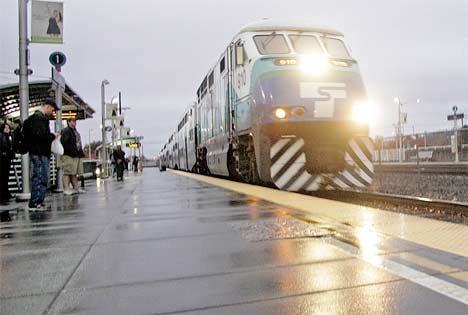Kent resident Doug Scharnhorst thinks the city needs to fund a railroad crossing construction project so train engineers no longer have to blow their horns as the locomotive speeds through downtown.
Scharnhorst has lived 15 years in the Mill Creek neighborhood, just east of the Burlington Northern Santa Fe tracks.
“They go through town all hours of the day and night,” Scharnhorst said. “It’s loud.”
Scharnhorst wants the city to include what’s known as the railroad quiet zone project in the 2011 budget. He testified before the Council at a Sept. 21 public hearing and shared the reasons he supports the project during a phone interview.
The City Council has a second public hearing for comments about the budget at 5 p.m. Nov. 2 at City Hall. Mayor Suzette Cooke’s proposed $146 million operating budget, including a $62 million general fund budget, is under review by the City Council for final approval. The Council expects to adopt the budget at its Dec. 14 meeting.
Scharnhorst wants the project for more than his own peace and quiet. He believes the city needs the quiet zone in order to attract the new housing developments it wants downtown. More than 50 freight, Amtrak and Sounder commuter trains go through Kent each day.
“Kent wants to encourage decent dwellings downtown with apartments and condos and maybe a hotel by the parking garage,” said Scharnhorst, who commutes by Sounder to his job as an accountant at a Puyallup law firm. “But anything in the valley you’re going to have to listen to train noise. You hear them from South 212th all the way through Kent when the trains sound their horns at every intersection.”
City transportation officials are studying construction improvements at downtown railroad crossings so train engineers would no longer have to sound their horns at intersections.
Crews would instruct new barriers to further separate vehicles and pedestrians from the tracks and eliminate the necessity of sounding horns. Crews also could install wayside horns, an automated warning system that places a device on a pole to give out an audible warning to drivers and pedestrians but the sound does not carry as far into surrounding neighborhoods.
“I have seen those used in trips to Chicago suburbs where the train goes by but does not blow its horn,” Scharnhorst said.
Cooke did not include any money for the railroad quiet zone project in her proposed budget to the Council. But she did refer to the project in a letter to Council attached to her preliminary budget.
“It will take at least a year’s work by staff before we can put a plan together and spend dollars (for the project),” Cooke said during a phone interview.
Cooke supports the quiet zone, but said it’s complicated to establish such a zone because of the negotiations required on the project with Burlington Northern Santa Fe officials. She said the negotiations need to happen before the city decides to spend money for the railroad quiet zone.
“There’s a lot more to it than putting a horn up,” Cooke said.
Council President Jamie Perry said in a phone interview that the railroad quiet zone remains under consideration by the Council as it debates what to add or subtract from the mayor’s proposed 2011 budget.
“It’s up for discussion and we are talking about it and whether we have the money to do it,” Perry said.
Perry said she has doubts about whether to fund the railroad project at this time even though the city’s current financial situation does not require any cuts.
“We are just coming out of a recession and the financial state of the city is uncertain,” Perry said. “I don’t want to throw money at things when we laid off folks just a few months ago.”
City cuts of $7 million last spring have put the city budget in much better shape than King County and surrounding cities such as Seattle, Bellevue and Tukwila, all of which are facing budget cuts. Kent also has saved roughly $4 million in costs next year because it no longer fully funds the Kent Fire Department, now part of a regional fire authority with King County Fire District 37 and Covington.
In Cooke’s budget, she proposed hiring 16 new employees as well as establishing reserve funds of $2 million to help fight Green River flooding and to cover lost tax revenues if two state liquor initiatives are approved by voters. If the liquor initiatives fail and no emergency flood money is needed, the money would go into a reserve fund.
Perry said discussion remains open about how many employees to hire, especially in the Panther Lake area. Most of the new employees would be assigned to the Panther Lake area, whose 24,000 residents annexed to the city in July. The state helps the city pay for annexation costs with state annexation funds returned to the city through a sales tax rebate on purchases in Kent. That’s worth about $4 million per year to the city.
“Right now we are looking at the proposed changes and whether we agree or not,” Perry said about two recent Council workshops about the budget.
Residents can let the Council know what projects and services they want to see in the 2011 budget at the Nov. 2 public hearing.
Residents can view the preliminary budget in the city clerk’s office at City Hall. For more information about the proposed budget, call the city finance department at 253-856-5264.
City budget public hearing
What: Kent City Council meeting
When: 5 p.m. Nov. 2
Where: Kent City Hall, 220 Fourth Ave. S.
Talk to us
Please share your story tips by emailing editor@kentreporter.com.
To share your opinion for publication, submit a letter through our website https://www.kentreporter.com/submit-letter/. Include your name, address and daytime phone number. (We’ll only publish your name and hometown.) Please keep letters to 300 words or less.

